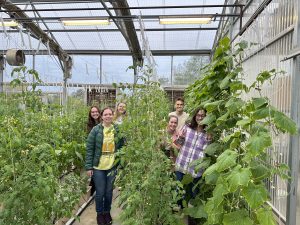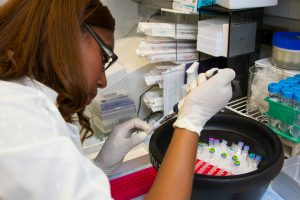Experiential learning activities in Abiotic stress tolerant plant production:

Innovative, Abiotic stress tolerant, and sustainable approaches to intensifying agricultural production are needed to meet the rising global demand for food and nutrition. This is particularly important due to the increasing water scarcity and agricultural land. Crop production in controlled environment facilities such as hydroponics and aeroponics offers new solutions to address these issues. Controlling the growing environments (light, CO2 concentration, temperature, substrate, and nutrient supply to plants) in food production systems results in higher crop yield, improved nutritional qualities, reduced usage of pesticides/fungicides, and food safety.
Learning outcome: Students will learn how to enhance crop productivity, produce quality crops, utilize resources efficiently, and reduce energy inputs.

Experiential learning activities in Microbiomes:
Microbial consortiums are significant players in plant stress tolerance. Students participating in the program will investigate the functional role of phytohormone-producing microbial consortium in the rhizosphere in activating plant resistance during climatic stresses. The students will be involved in answering critical questions such as (i) What core microbiome is lost or gained during temperature variations? (ii) how do core microbiomes function in higher or lower stress intensities?
Learning outcome: Students will learn microbial identification techniques and identify changes in metabolic capabilities of the changing microbial populations (iii) what phytohormone biosynthetic gene networks exist in rhizosphere microbes at single or consortium levels? Students will understand plant-microbiome-stress interactions to identify molecular and signaling mechanisms.
Experiential learning activities in Biocontrol agents for pathogen-resistant:
Cordyceps mushrooms (C. sinesis and C. militaris) contain antifungal and insect control compounds. These are entomopathogenic fungi that can infect insects that do not require ingestion. It is suggested that plants may be inoculated as endophytic organisms to provide systemic protection. Previous researchers have demonstrated reasonable control of the soil-borne pest coconut root grub in sandy soil through simple physical introduction into the root zone root zone 7-10. Students will learn how to cultivate cordyceps mushrooms in controlled environments using commercially obtained spore. Biocontrol molecules such as cordycepin, cordicepic acid, adenosine, and hydroxyethyl adenosine present Cordyceps will be extracted using ethanol and tested using Liquid chromatography followed by mass spectrometry.
Learning outcome: Students will learn how to produce cordyceps and extract and quantify the molecule using LC-MS.
Design and reconstruct a biosynthetic pathway in a suitable microbial host strain:
Students will learn how to immobilize microorganisms and the concentration of biomass-degrading enzymes secreted

under varying conditions. They will measure the sugar conversion as a function of time by measuring the concentration using HPLC. These fermentable sugars will produce different biocontrol microorganisms, Agrobacterium, Alcaligenes, Arthrobacter, Bacillus, Rhizobium, Serratia, Streptomyces, and Xanthomonas.
Learning outcome: Students will learn how to use genetic engineering tools, such as expression vectors and genome editing tools (e.g., CRISPR/Cas9), to introduce pathway enzymes into the microbial cells.